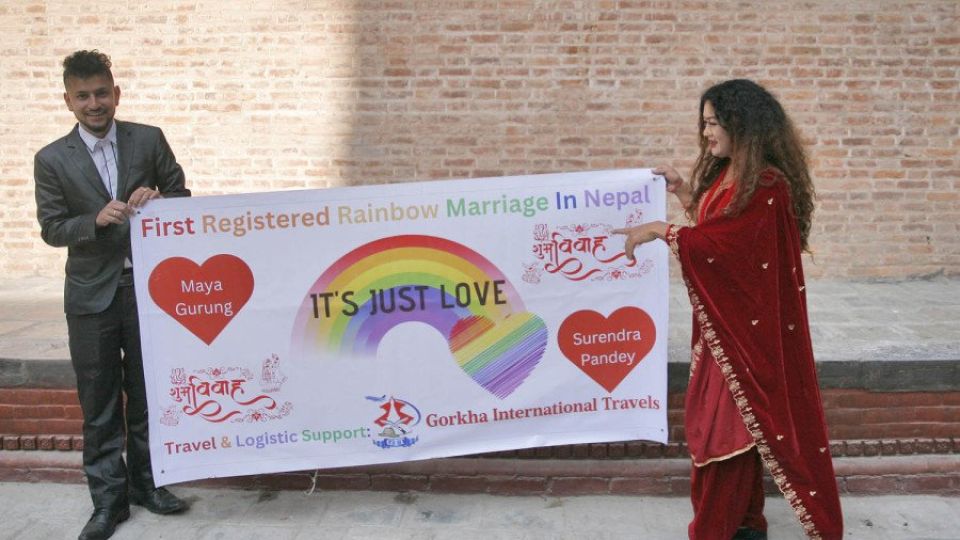December 4, 2023
KATHMANDU – Nepal took yet another historical step on Wednesday towards safeguarding the rights of sexual and gender minorities. Dordi Rural Municipality in Lamjung district registered a same-sex marriage, making Nepal the first country in South Asia to do so. The local government’s move is based on the Supreme Court’s June ruling directing the government to register the marriages of same-sex and traditional non-heterosexual couples.
Why is Dordi Rural Municipality’s decision important?
People from sexual and gender minority communities have long been demanding recognition for same-sex marriages. As the administration was not ready, the rights activists had to move the Supreme Court seeking its intervention. The court, in a landmark ruling on June 27, ordered the authorities to register marriages involving same-sex and non-heterosexual couples. Nepal’s registration of the marriage makes it the first South Asian country to do so. In 2019, same-sex marriage was registered in Taiwan, a first in Asia.
A single bench of Justice Til Prasad Shrestha issued an interim order to the government based on various constitutional provisions that ensure the equality of every individual before the law. Responding to a writ petition from rights activists and advocates, the court also issued a show cause notice to the government seeking a written clarification about the legal instruments of same-sex marriage.
Based on the ruling, Surendra Pandey, 27, of Kawasoti Municipality-8 in Nawalparasi East, and 37-year-old Ram Bahadur Gurung, who goes by the name Maya, of Dordi Rural Municipality applied for registration of their marriage at the local unit. The rural municipality acted as per their demand, creating history, based on the court order.
Manisha Dhakal, executive director of Blue Diamond Society, a non-governmental organisation advocating the rights of LGBTIQ+ people, welcomed the registration, hailing it as an extremely important decision. “However, getting a certificate alone is not enough. It is important that the couple has the right to inherit property, get tax subsidies and adopt children, among others,” she told the Post. “We will continue to lobby for other rights while safeguarding the one that is already achieved.”
What was the ground for the Supreme Court’s ruling?
The ruling was based on Article 18 (1) of the Constitution of Nepal that guarantees the right to equality and Clause 69 (1) of the Civil Code that ensures the right of any individual to get married. Different rulings from the past too provided the ground to direct the government to constitute an interim mechanism to register the marriage. In 2015, the Supreme Court issued a directive to revise or scrap all the discriminatory laws against the sexual and gender minorities.
In December 2022, the Supreme Court directed the government to grant a non-tourist visa to Tobias Volz, a German national who was married to Adheep Pokharel, a Nepali citizen. The gay couple had married in 2018 in Germany. The government had refused to provide a non-tourist visa to Volz, saying it does not recognise their marriage. Intervening in the matter, the court directed the government to give Volz a non-tourist visa.
In 2017, a lesbian couple—Suman Panta, a Nepali, and Leslie Luin Melnik, a US citizen—had also challenged the Nepal government’s decision to deny a non-tourist visa to the American. The court had said, “If a foreign national claiming to be married to a Nepali citizen submits a marriage registration certificate and the Nepali citizen confirms the marriage in their visa application, then the foreign national should not be denied a visa.”
The advocates fighting for the rights of the LGBTIQ+ community say the present achievement is based on the interim order and the court is yet to start a final hearing on the matter. It is possible that the interim order can be scrapped while passing the final verdict. Anurag Devkota, an advocate who had filed the case seeking the interim order, said they want a permanent solution, that is, a revision to the existing civil code
How is the civil code a hurdle?
The code that came into effect in 2017 defines marriage as when a man and a woman accept each other as husband and wife. It, therefore, needs revision to insert a provision for two individuals can get married. The advocates also call for scrapping the need to mention husband and wife in the marriage certificate.
The country’s top court in 2015 itself had directed the government to formulate law for same sex marriage after a study. Though the study report recommending allowing all forms of marriage was submitted in 2015, successive governments took no step to frame the law as per the suggestions. Instead, the Civil Code that came into force after the court’s ruling retains the discriminatory provisions.
In a move to reinforce the 2015 ruling, Shrestha’s bench in June too had asked the government to take the steps towards amending the law but this has yielded no results yet.
What are other important rulings in establishing the rights of the community?
It was a 2007 ruling from the Supreme Court that recognised LGBT rights as fundamental human rights, ensured protection for gender and sexual minorities, and legalised homosexuality. It was the same ruling that pressured the country’s political actors into recognising the rights of queers in the Constitution of Nepal. At least seven articles of the constitution directly or indirectly safeguard the rights of the community.
Article 18 (2) and (3) state there will be no discrimination in the application of general laws and other discriminations on the grounds of origin, religion, race, caste, tribe, and sex among others. Article 42 says that minorities, marginalised communities, persons with disabilities, gender and sexual minorities have the right to participate in the bodies of the state as per the principle of proportional inclusion.
In addition, there are fundamental rights to citizenship with gender identity, to live with dignity, rights to freedom and inclusion, among others, that safeguard the rights of sexual and gender minorities.


